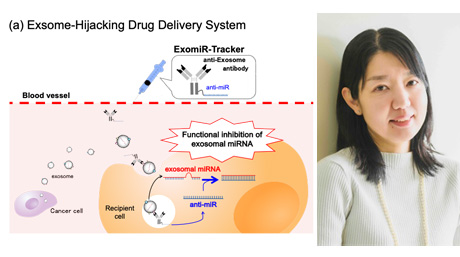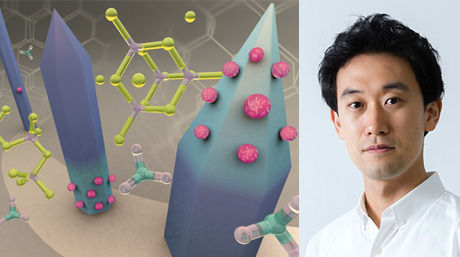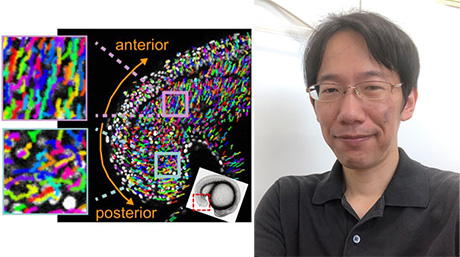Life Science and Technology News
【Labs spotlight】To Laboratory
The Department has a variety of laboratories for Life Science and Technology, in which cutting-edge innovative research is being undertaken not only in basic science and engineering but also in the areas of medicine, pharmacy, agriculture, and multidisciplinary sciences. This "Spotlight" series features a laboratory from the Department and introduces you to the laboratory's research projects and outcomes. This time we focus on Taiko To Laboratory, which conducts both basic and applied research on epigenetics, the fundamental mechanism that controls many biological events, using plants and fission yeast as materials.

Areas of Supervision
Primary/Life Science and Technology
Associate Professor Taiko To![]()
| Office | Room 928, B2 building, Suzukakedai campus |
|---|---|
| Degree | PhD 2011, The University of Tokyo |
| Areas of Research | Molecular Biology, Genomics |
| Keywords | Epigenetics, Plants, Genomics, Synthetic biology |
| WEBsite URL | To Lab. |
Research interest
Cells within an individual of a multicellular organism have essentially the same DNA sequence. In order for a cell to express a unique feature, it is necessary to utilize cell-type specific genes, and "epigenetics" makes this possible. Epigenetics is a mechanism that specifies the active or silent state of genes by applying chemical modifications to DNA and histone proteins without changing the DNA sequence (Fig. 1). The core of its regulation is conserved among many eukaryotes and plays an important role in a variety of biological processes, including reproduction, development, and environmental responses.

The genomic DNA of many organisms contains not only genes necessary for vital functions, but also large amounts of potentially harmful elements such as transposable elements and viruses. Therefore, organisms are to properly identify these genes/elements and regulate their expression by applying appropriate epigenetic modifications to each of them. Abnormalities or breakdowns in this mechanism can induce developmental abnormalities and diseases such as cancer. Despite such importance, how does an organism distinguish between genes and harmful elements in its genome? When and in which cells? What happens when a new harmful elements is introduced from the outside? Many mysteries still remain unsolved.
Our laboratory is vigorously pursuing both basic and applied research on epigenetics (Figure 2), the fundamental mechanism that controls many biological events, using plants and fission yeast as experimental materials (Figure 3). In particular, we are trying to elucidate how organisms appropriately regulate genes and harmful elements through epigenetic modifications, how such modifications are inherited from one generation to the next, and how environmental changes affect epigenomic patterns. In addition, based on such results of basic researches, we are challenging the development of artificial epigenome editing technology. We aim to apply the resulting new technologies not only to model organisms but also to crops and animal cells, thereby contributing to the achievement of the SDGs and the development of medical technologies.
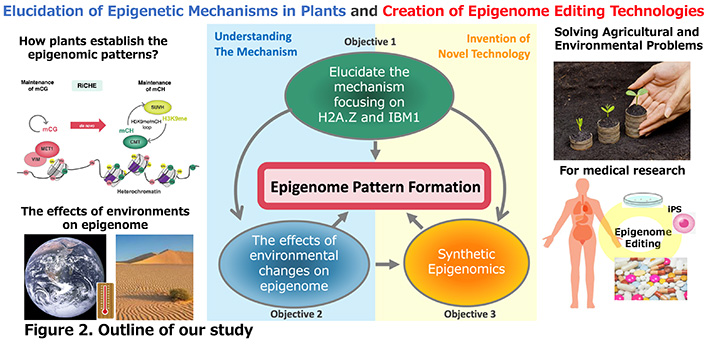
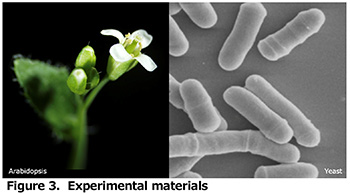
Selected publications
Crosstalk among pathways to generate DNA methylome. To TK#, Kakutani T*. Current Opinion in Plant Biology, 2022, 68, 102248.
To TK*#, Yamasaki C, Oda S, Tominaga S, Kobayashi A, Tarutani Y, Kakutani T*. Local and global crosstalk among heterochromatin marks drives DNA methylome patterning in Arabidopsis. Nature Communications 2022, 13: 861.
To TK*#, Nishizawa Yª, Inagaki Sª, Tarutani Yª, Tominaga S, Toyoda A, Fujiyama A, Berger F, Kakutani T*. RNA interference-independent reprogramming of DNA methylation in Arabidopsis. Nature Plants, 2020, 6: 1455–1467.
Kim JM#, To TK#, Matsui A, Tanoi K, Kobayashi NI, Matsuda F, Habu Y, Ogawa D, Sakamoto T, Matsunaga S, Bashir K, Rasheed S, Ando M, Takeda H, Kawaura K, Kusano M, Fukushima A, Endo TA, Kuromori T, Ishida J, Morosawa T, Tanaka M, Torii C, Takebayashi Y, Sakakibara H, Ogihara Y, Saito K, Shinozaki K, Devoto A, Seki M. Acetate-mediated novel survival strategy against drought in plants. Nature Plants, 2017, 3: 17097.
To TK#, Saze H#, Kakutani T. DNA methylation within transcribed regions. Plant Physiology, 2015, 168: 1219-1225.
Ito T#, Tarutani Y#, To TK#, Kassam M, Duvernois-Berthet E, Cortijo S, Takashima K, Saze H, Toyoda A, Fujiyama A, Colot V, Kakutani T. Genome-wide negative feedback drives transgenerational DNA methylation dynamics in Arabidopsis. PLoS Genetics, 2015, 11: e1005154.
To TK*#, Kim JM. Epigenetic regulation of gene responsiveness in Arabidopsis. Frontiers in Plant Science, 2014, 4: 548.
Contact
Associate Professor Taiko To
Room 928, B2 building, Suzukakedai campus
E-mail : to.t.ab@m.titech.ac.jp
Tel / Fax : +8145-924-5818
*Find more about the lab and the latest activities at the lab site![]() .
.
*May 1, 2025:Some of the content has been updated with the latest information.


